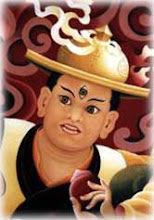Theoretically, there is much to recommend in this recent Memorandum (which came out prior to the recent meeting about Tibet in Dharamsala). However, the stumbling block in practice is the section on "Religion", where the Central Tibetan Administration (Tibetan Government in Exile) is asking the Chinese for something that they and the 14th Dalai Lama are not prepared to give themselves.
Religion
"Religion is fundamental to Tibetans and Buddhism is closely linked to their identity. We recognise the importance of separation of church and state, but this should not affect the freedom and practice of believers. It is impossible for Tibetans to imagine personal or community freedom without the freedom of belief, conscience and religion. The Constitution recognises the importance of religion and protects the right to profess it. Article 36 guarantees all citizens the right to the freedom of religious belief. No one can compel another to believe in or not to believe in any religion. Discrimination on the basis of religion is forbidden."
If everyone was indeed allowed "the freedom of belief, conscience and religion", it might would be possible to imagine once again "personal and community freedom" for all Tibetans in exile and even back in Tibet, as opposed to the division and confinement caused by the unconstitutional ban on Dorje Shugden (which breaks Article 36) and ostracism of Shugden practitioners.
How is the forced signature campaign compliant with this ideal "No one can compel another to believe in or not to believe in any religion"?
It is really hard to see how the TGIE can justify speaking these noble words when their deeds go in the opposite direction, away from the "freedom of religious belief" and right toward "discrimination on the basis of religion".
This is a telling and somewhat ironic statement:
"We recognise the importance of separation of church and state, but this should not affect the freedom and practice of believers."
The fact that church and state in the exile community are not separate is precisely what has "affected the freedom and practice of believers". This constitutional violation of religious freedom would never have happened if the Dalai Lama were not both a religious and political leader.
A patriotic Tibetan woman who is not a Shugden practitioner comments on the recent meeting in Dharamsala in He Has Got it Wrong. (This is based on Eliot Sperling's article of the same name.) Here are some extracts:
This meeting could have been both special and historic, if we had taken the bold and painful step that I believe is unavoidable: To allow the Dalai Lama to retire into the religious sphere, and set the stage for the separation of religion and politics.
We all know that Buddhism doesn’t claim to answer the world’s problems. And yet we are expecting the Dalai Lama to solve our political problems. We even elected another Lama, Samdong Tulku, to be our Prime Minister. But by having religious leaders doing political work, we have also been limiting ourselves in ways to struggle for the freedom of our country, which in essence is a worldly problem.
There were specific historical events which led to the emergence of a theocratic form of government in Tibet 500 years ago. But in the last 50 years, since external forces made us join the modern world, the geopolitical situation has become so complex, the demands to government so overwhelming that one guy alone at the top cannot deliver.
In our hearts, we know that worldly problems should be dealt with by worldly measures and by worldly people. As a consequence, let our Lamas return to their monasteries and resume their roles as spiritual teachers. This will clear the way for capable laypeople, men and women, to come forward and eventually, from their midst, a new leader will emerge who will unite and lead us in our struggle for freedom and justice.
In Dharamsala this month, we missed the opportunity to take charge. Now that would have made the meeting not only special but truly historic.




